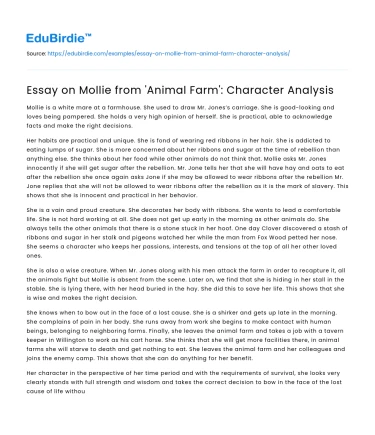Introduction
George Orwell's "Animal Farm" is a profound allegory that explores the dynamics of power and corruption. Within this narrative, Mollie, the vain and self-indulgent mare, serves as a symbol of the bourgeois class that resists revolutionary change. Her character provides a critical lens through which Orwell examines the complexities of societal transformation. Despite her seemingly minor role, Mollie's actions and choices reveal significant insights into human behavior and resistance to change. This essay embarks on a detailed analysis of Mollie's character, exploring her symbolism, motivations, and the broader implications of her actions within the narrative. Such an analysis not only enriches the understanding of Orwell's work but also invites reflection on similar dynamics in real-world socio-political contexts. By examining Mollie's portrayal, this essay aims to elucidate the intricate interplay of personal desires and collective ideals, highlighting the challenges inherent in the quest for a more equitable society.
Mollie's Symbolism and Role in the Narrative
Mollie represents the superficial and self-centered elements of society, particularly those who prioritize personal comfort over collective progress. In "Animal Farm," she is depicted as a character who is more concerned with her appearance and material possessions than with the ideals of the animal revolution. Orwell writes, "She would only condescend to listen to the principles of Animalism when sugar was involved." This quote underscores her reluctance to embrace change, reflecting the attitudes of individuals who benefit from existing power structures and are therefore resistant to revolutionary ideologies. Mollie's fixation on ribbons and sugar lumps is emblematic of her desire for the luxuries she enjoyed under human rule, highlighting a critical aspect of her character: the inability to sacrifice personal indulgence for the greater good.
Save your time!
We can take care of your essay
- Proper editing and formatting
- Free revision, title page, and bibliography
- Flexible prices and money-back guarantee
Moreover, Mollie's eventual defection from Animal Farm underscores the broader theme of betrayal and the fragility of collective movements. Her departure symbolizes the ease with which those with superficial allegiances can be swayed by the promise of personal gain. This aspect of her character is not only pivotal to the narrative but also serves as a cautionary tale about the challenges faced by revolutionary movements in retaining the loyalty of their constituents. Mollie's actions reflect a recurring historical pattern where revolutions are often undermined by internal divisions and the self-interest of individuals. Thus, her portrayal in "Animal Farm" is a critical commentary on the obstacles to achieving true social change.
Mollie's Motivations and Psychological Insights
Understanding Mollie's motivations requires an exploration of her psychological makeup. Mollie's behavior can be interpreted through the lens of psychological theories such as Maslow's hierarchy of needs. At the base of this hierarchy are physiological and safety needs, which Mollie prioritizes above all else. Her preoccupation with ribbons and sugar lumps corresponds to a desire for security and comfort, which she perceives as being threatened by the revolutionary changes on the farm. This perspective aligns with the notion that individuals are often driven by a need to satisfy basic comforts before they can engage with higher-order ideals such as community and self-actualization.
Additionally, Mollie's actions can be analyzed in terms of cognitive dissonance theory, which suggests that individuals experience psychological discomfort when confronted with conflicting beliefs or values. Mollie's reluctance to embrace Animalism might stem from the dissonance between her desire for luxury and the revolutionary call for equality and sacrifice. Rather than resolving this dissonance by adopting new beliefs, Mollie chooses to flee, seeking an environment where her existing values remain unchallenged. This decision underscores the psychological barriers to change and highlights the difficulty of altering deeply ingrained belief systems.
Counter-Arguments and Broader Implications
It could be argued that Mollie's character is merely a simplistic representation of vanity and self-interest, lacking depth and nuance. Critics might assert that her portrayal reinforces negative stereotypes without offering a comprehensive understanding of her motivations. However, this perspective overlooks the broader implications of Mollie's character as a reflection of societal dynamics. By embodying the bourgeois reluctance to embrace change, Mollie serves as a microcosm of the challenges faced by revolutionary movements. Her character invites readers to consider the multifaceted nature of societal transformation, where individual desires often clash with collective ideals.
Furthermore, Mollie's narrative arc encourages reflection on real-world parallels. Historical revolutions, such as the Russian Revolution, often saw segments of the population resisting change due to vested interests. Mollie's behavior mirrors that of individuals who prioritize personal gain over social progress, highlighting the complexities of achieving unity in the pursuit of equitable societies. By acknowledging these counter-arguments, the analysis of Mollie's character becomes more nuanced, reinforcing the relevance of Orwell's allegory in contemporary discourse.
Conclusion
In conclusion, Mollie's character in "Animal Farm" serves as a poignant symbol of resistance to change and the inherent difficulties faced by revolutionary movements. Her actions and motivations offer valuable insights into the psychological and societal factors that influence individual behavior in the face of transformation. Through Mollie, Orwell critiques the superficiality and self-interest that can undermine collective efforts, while also prompting readers to reflect on similar dynamics in real-world contexts. Despite her limited presence in the narrative, Mollie's character embodies timeless themes of human nature and societal change, underscoring the enduring relevance of "Animal Farm" as a critical examination of power and resistance. Ultimately, the analysis of Mollie enriches the understanding of Orwell's allegory, inviting ongoing reflection on the interplay between personal desires and collective ideals.






 Stuck on your essay?
Stuck on your essay?

